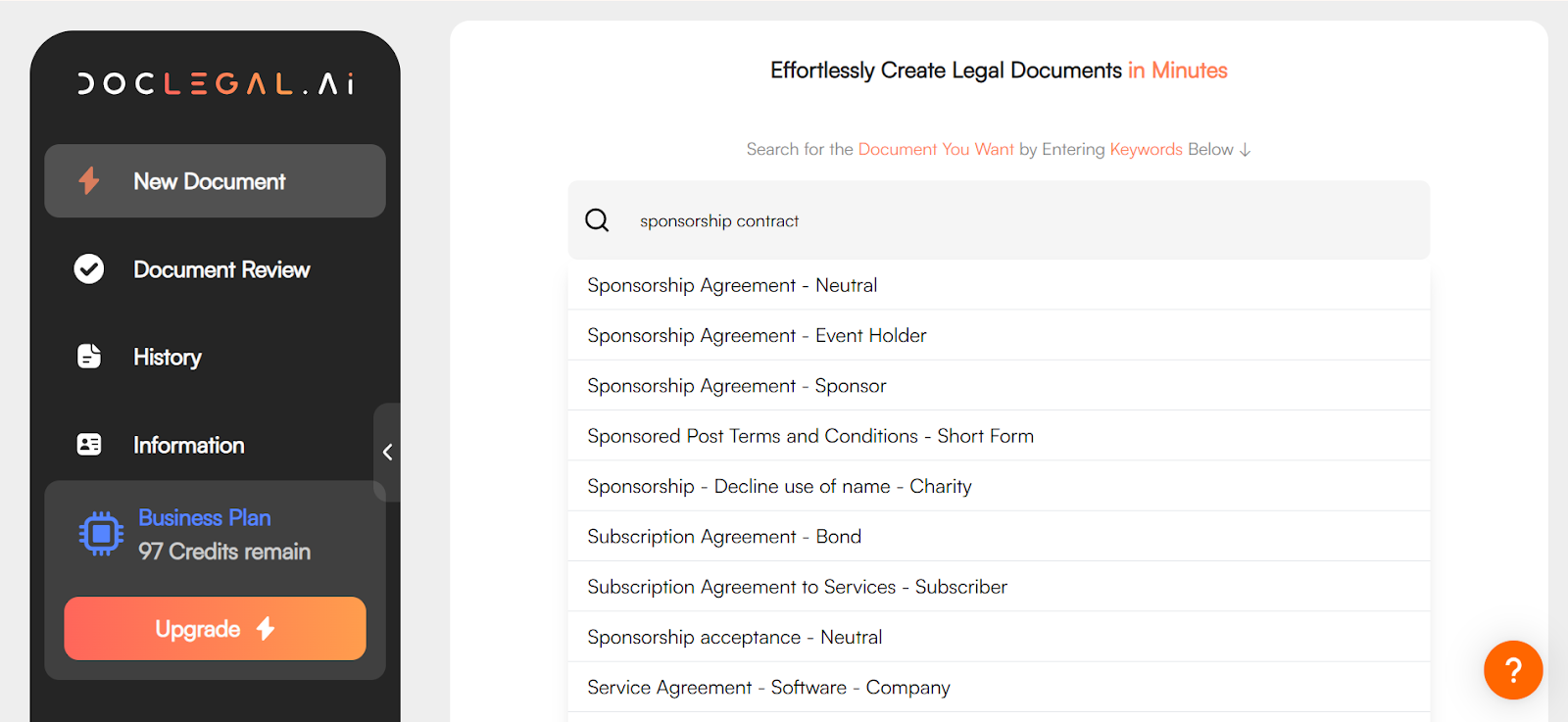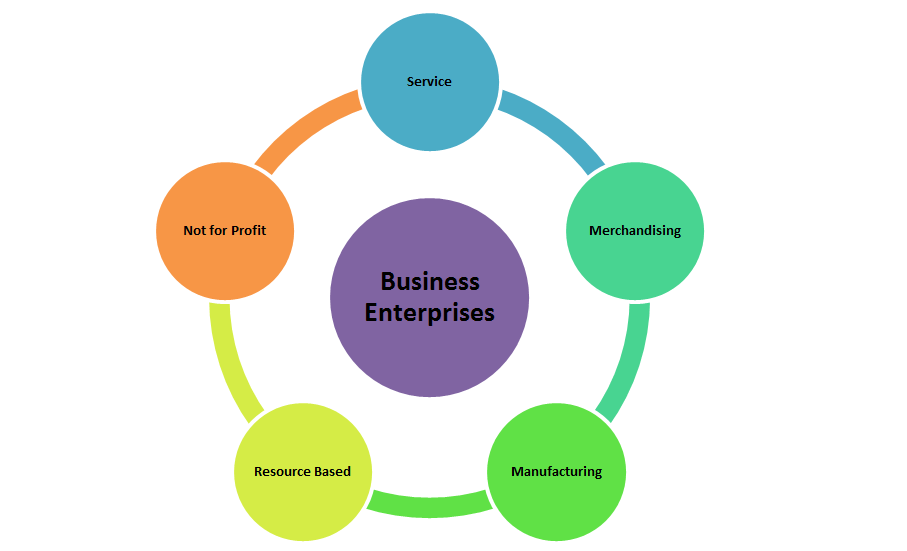Maybe you’re a small business owner, looking to drive engagement and boost your own business. Or maybe you’re a marketing specialist who’s looking to secure a sponsorship. Regardless of your position, securing a sponsorship can be a game-changer for small and medium-sized enterprises (SMEs). Whether you’re launching a new product, hosting an event, or building brand awareness, sponsorships provide crucial financial support and marketing exposure.
However, navigating sponsorship contracts can be daunting—especially for young entrepreneurs. What is the difference between exclusive and non-exclusive rights? How should you tackle payment schedules and branding rights?
The good news? You don’t need to hire expensive lawyers or waste hours drafting agreements from scratch. With AI-powered tools like DocLegal.ai, creating airtight sponsorship contracts is faster, cheaper, and hassle-free. This guide breaks down the key elements of sponsorship agreements and explains how technology can simplify the process—so that you can focus on growing your business.
Why Sponsorship Contracts Matter for SMEs
Sponsorships are partnerships where a company (the sponsor) provides financial support to another business (the party being sponsored) in exchange for promotional benefits. These kinds of mutually-beneficial agreements are common in sports, entertainment, startups, and community events. However, without a well-structured contract, misunderstandings can lead to disputes over payments, branding misuse, or unmet expectations.
A solid sponsorship agreement protects both parties by clearly outlining obligations, deliverables, and legal safeguards. For SMEs, this is especially critical—you want to ensure you’re getting fair value out of your contract, and at the same time, you want to avoid legal disputes, which could be costly.
This is why it’s important to cover all your bases, and to ensure that you’re familiar with the key terms of a sponsorship contract, before signing and finalising one.
Key Elements of a Sponsorship Contract
- Payment Schedules
One of the most common pitfalls in sponsorship deals is vague payment terms. Will the sponsorship fee be paid upfront, in installments, or after certain milestones have been met?
So to minimize conflicts, your contract should specify:
- Sponsorship fee amounts and due dates (e.g.: 50% upfront, 50% upon event completion)
- Late payment penalties to discourage delays.
- Refund policies if the agreement is terminated early.
Example: You’re organizing a startup conference, and a sponsor has agreed to fund $10,000. The contract should clearly state whether payments are tied to attendee numbers, social media promotions, or other KPIs. Clear terms can prevent awkward follow-ups, and ensure that you aren’t left sourcing funding last minute when the payment you’ve been relying upon doesn’t arrive.
- Branding Rights
In exchange for financial support, sponsors receive visibility. Hence, the sponsorship contract must define how and where their brand will appear. Key considerations include:
- Logo placement (event banners, websites, merchandise).
- Exclusivity clauses (e.g., no competing brands at your event).
- Approval rights (sponsors may want to review marketing materials before publication).
If you’re a small fitness brand partnering with a supplement company, you’ll need to agree on whether their logo appears on your apparel, social media, or YouTube videos. Ambiguity here can lead to disputes — imagine, for example, if your sponsor is not satisfied with your event backdrop and threatens to pull out at the last minute.
Therefore, always make sure to put down your sponsor’s display and approval rights, and to clarify whether these are exclusive or non-exclusive.
- Deliverables
Deliverables are what each party must provide. Sponsorships are a mutually beneficial exchange; both sides must fulfil their promises. From the sponsor’s side, their deliverables include the sponsorship fee (cash), and also any free products or services that will be provided. Whereas, the sponsored party has the obligation to promote the sponsor, through measures such as providing ad space, shoutouts, and VIP access.
Furthermore, some sponsorship agreements may hinge on performance metrics, such as minimum social media impressions (based on likes, views, and such), or the amount of foot traffic. The exact sponsorship amount may also be contingent upon certain KPIs being reached,
Example: A beverage company has agreed to sponsor your pop-up shop. However, they might have expectations that a certain number of product samples will be distributed. Without clear written terms,
Without written terms, you risk underdelivering, or being asked for more than you are capable of giving.
- Termination Clauses
Not all sponsorships go as planned. Common reasons for sponsorship contracts to end early can include disagreements, unmet expectations, or even something as simple as cash flow issues. To avoid such ugly breakups, a sponsorship contract should outline:
- Conditions for termination: These are the conditions where, once met, either party would be able to gracefully withdraw from the contract. This can include breaches of contract (e.g.: failure to pay before certain deadlines, or failure to perform what has been written down in the contract). Allowing parties to terminate because of low attendance can be undesirable for the sponsored party, especially since this is something they have no control over. However, this is a standard term incorporated into sponsorship agreements, and your sponsor may insist on this term being in place. See if you can address this issue during negotiations, and come to a consensus.
- Notice periods: Termination often does not take place immediately. It is common to require several working days or weeks’ notice before ending the agreement, so that the parties would have time to adjust.
- Consequences of early termination: If one party goes ahead with the termination, they often have to pay partial compensation to the other party, in order to bridge the gap during which the other party needs to make different arrangements.
Imagine a tech startup sponsoring a podcast, only to realise that they have completely different target audiences. A clearly-defined termination clause would allow either party to exit gracefully, without spending time and money on legal battles.
- Exemption Clauses
An exemption clause (sometimes also called an “exclusion clause” or “limitation clause”) is a clause that limits how much one party has to pay if things don’t go as planned. It can cap or ‘limit’ financial liability, and exclude certain types of losses altogether.
Most jurisdictions have enacted statutes about exemption clauses. One example is that you cannot exclude liability for your own criminal or negligent acts. (You can, however, shift the liability towards another party in certain agreed-upon circumstances, which will be discussed below.) It is recommended to check the exact legislations that are applied to your area, but as a rule of thumb, an exemption clause that is fair and reasonable will generally be accepted by the courts.
Your sponsorship contract should address:
- Indemnification: To “indemnify” someone means to compensate them for harm or losses. In other words, an indemnity is the parties’ arrangement on how liabilities should be distributed. The courts will generally give effect to the parties’ wishes, so it is especially important to discuss this with your contracting partner, and come to a consensus.
- Example: the sponsor, AA Electronics Company, has agreed to indemnify their sponsored podcaster, Bob, “against the payment of any liabilities or expenses which he incurs as a result of third party claims, in connection with promoting AA Electronics Company”. Bob uses misleading promotion tactics, and is sued by multiple customers. Due to the terms and broad nature of the indemnity, AA Electronics Company is obliged to compensate Bob for his legal costs, even though Bob is completely at fault.
From this example, we can see the importance of having an iron-clad indemnity clause, which is capable of covering all unforeseen events.
- Force Majeure: This is a French term, which translates to “superior force”. It is legal terminology for unforeseen circumstances which prevent the parties from fulfilling the contract. An example would be if a company from Country A decided to sponsor another one in Country B, and later, the Country B government criminalised receiving any form of financial assistance from Country A. In such cases, a force majeure clause sets out the arrangements, in case either party is unable to perform.
- Example: CC Snacks Company has agreed to sponsor Danielle’s promotion event, and has contributed towards the costs of advertising and booking a room. However, on the day of the event, a freak typhoon forces the event to be cancelled. Luckily, the parties can refer back to their force majeure clause, which states that Danielle will compensate CC Snacks for 70% of the expenses that were already incurred. The contract comes to an end, and the parties part ways on good terms, willing to work together again in the future.
Exemption clauses are critically important to include in your contract, so make sure to discuss what grounds will give rise to liability, and how losses will be allocated. Having clear legal terms will save you from legal headaches later down the road.
How DocLegal.ai Simplifies Sponsorship Contracts
Drafting a sponsorship agreement from scratch is time-consuming, not to mention unnecessary in this time and age. And hiring a lawyer can cost thousands (if not tens of thousands) of dollars. This is where DocLegal.ai comes in, as a game-changer for budget-conscious SMEs.
Here’s how DocLegal.ai can streamline your sponsorship contract drafting process. These steps can be applied to any other type of contract, such as general business agreements, employment contracts, sales contracts, non-disclosure agreements, and more! Whatever your needs, DocLegal.ai will be there to help you.
- Instant, Customizable Templates
DocLegal.ai offers pre-built sponsorship contract templates tailored to different situations. Instead of starting from zero, you input your deal specifics (party names, payment terms, branding rights, duration), and the AI generates a legally sound draft in minutes.

- Smart Legal Guidance
The Doc.Legal AI editor explains complex clauses in plain English, helping you understand the terms as you draft. For instance, if you’re unsure about exemption clauses, the AI can both give you a definition, and suggest standard language to protect both parties.
- Automated Risk-Highlights and Review
What risks are there, and what are your potential liabilities? Worry no more! At the review stage, the Doc.Legal AI editor can go through each of the most common scenarios (indemnity, refund, cancellation, etc.) and summarise each party’s liabilities. It can also check your contract against standard industry practice. You can even ask further questions to the AI, and seek its advice in negotiating more equitable terms.
- Effortless Negotiation & Edits
Need to adjust payment terms or branding rights? Instead of emailing back-and-forth with lawyers, you can edit clauses in real-time and share a revised version with your sponsorship partners instantly.
- Cost Savings
Traditional legal fees for drafting contracts can rapidly drain an SME’s budget. DocLegal.ai provides professional-quality agreements at a fraction of the cost — perfect for startups and small businesses.
Final Thoughts
Sponsorships are powerful tools for SMEs, but poorly structured contracts can turn them into nightmares. By understanding payment schedules, branding rights, deliverables, and legal safeguards, you will be able to negotiate fair deals with confidence.
Tools like DocLegal.ai democratize access to legal expertise, allowing SMEs to create professional contracts quickly and affordably. Instead of fearing fine print, you’ll have a tool at your side to rapidly highlight the business risks; and instead of stressing over equitable terms, you can focus on what really matters, which is building partnerships that grow your business.
Next time you pitch to a sponsor, remember: a solid sponsorship contract isn’t just paperwork — it’s the foundation of a successful, stress-free collaboration. And with DocLegal.ai streamlining the process, you’ll be able to revise clauses, ensure compliance with legislation, and protect your business interests.
Sign up now to enjoy 50% off your first subscription, and learn how you can simplify your day-to-day bureaucratic and legal tasks.


.jpeg)




